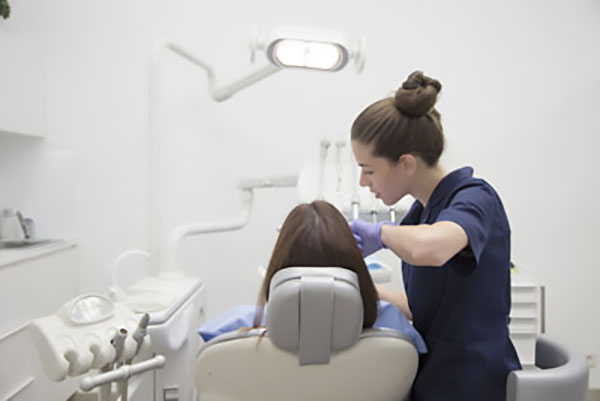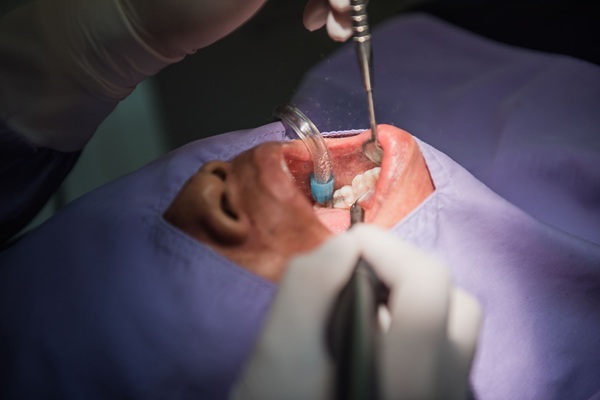Getting a Dental Crown After a Root Canal

Most patients require a dental crown after a root canal to ensure the appearance, function and health of the tooth are protected. It is helpful to understand why a dental crown may be necessary and how the treatment process works for both root canal therapy and dental crown placement.
When a dental crown is needed after root canal treatment
A dental crown may be needed if the affected tooth is weakened or has cosmetic or functional concerns. The following is a complete overview of what to expect when getting a dental crown placement after root canal therapy, including insights into how you can care for your dental crown long term.
What is a root canal?
A root canal is performed to remove the infected pulp inside a tooth. Tooth pulp may become infected or damaged due to deep tooth decay, a chipped or cracked tooth, or a variety of other reasons. The procedure is often necessary to preserve the health of the tooth and ensure any infection does not spread. It is a safe and effective procedure, although many dentists may only recommend a root canal if less invasive treatments, such as a dental filling, are not an option.
When is a dental crown needed?
Not every root canal requires dental crown placement, and whether or not one is needed depends on the location of the tooth and how vulnerable the tooth is to future damage. A dental crown following a root canal serves many different purposes, which include:
- Long-term tooth protection
- Protection from sensitivity
- Restore the natural appearance
- Prevent decay and infections
The best way to determine if a dental crown is needed after your root canal is to discuss the treatment plan with your dentist.
How does the treatment process work?
Every patient has a different experience with root canal therapy, but the most common steps include removing the infected tooth pulp, cleaning the cavity, filling the cavity with a replacement material and then sealing the tooth up. If a crown is needed following the root canal, then the dentist may also take a dental impression of the tooth and place a temporary crown while the permanent one is crafted in the laboratory.
How can I care for the dental crown long-term?
You can care for your dental crown the same as you do natural teeth, which is by practicing good oral hygiene, limiting your consumption of foods that are high in sugar and other carbohydrates and visiting the dentist regularly. Be sure to brush two times a day and floss and use mouthwash as directed by your dentist to prevent further concerns with the affected tooth as well as surrounding teeth.
Do you currently need a root canal?
Give us a call today if you want to find out more information about root canal therapy and what signs indicate you may need a root canal. We are here to help our patients through each step of the treatment process, and our friendly staff can answer any questions you have along the way.
Request an appointment here: https://www.carolinasmilesdentist.com or call Carolina Smiles Family Dental at (828) 884-3702 for an appointment in our Brevard office.
Check out what others are saying about our services on Yelp: Read our Yelp reviews.
Recent Posts
Smile makeovers are a blanket term for one or multiple procedures that help you achieve your dream smile. From adjusting the positions or replacing teeth to brightening or repairing them, smile makeovers can transform your teeth and self-confidence. Take a look at a few services typically offered to improve your smile.When the teeth shift, they…
Oral surgery is sometimes necessary to correct issues that are beyond treatment from basic restorative or preventive care. A general dentist trained in oral surgery can often provide a variety of in-office procedures, offering both convenience and continuity of care. These treatments are performed in a comfortable setting, and they support long-term oral health, improve…
Are you considering a smile makeover? Read on to learn more. A smile makeover has both cosmetic and emotional value. The psychological effects extend to one’s self-esteem and self-image. According to the American Academy of Cosmetic Dentistry, nearly 99.7% of individuals consider a smile an important social asset. Smiles have a high social value, and…
Adult orthodontics has become an increasingly popular solution for individuals looking to improve their oral health and the smile's appearance. Dental professionals offer a variety of treatment options to address the unique needs of adult patients. The following guide will explore the most common treatments used in adult orthodontics, highlighting their benefits and effectiveness in…


